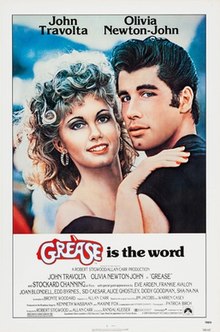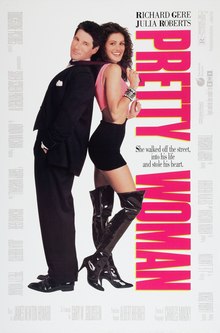In the previous post, I detailed five wonderfully awful romantic-unromantic songs. My focus in this post will be on a similar theme, but this time I will set my sights on film. What are the criteria for the romantic-unromantic movie? First, the movie must be largely described as romantic. Second, it must be regarded by the majority of the viewing public as a "triumph" in this respect. Lastly, despite the former impression, when closely examined, the moral of the story must turn out to be fundamentally immoral. I have narrowed the list down to three, mainly because these examples are so exceptional that placing anything on a list beside them would fail to do them justice.
3. Grease

Released in 1978, this film/musical continues to be popular among both young and old alike. The story details two high school students that meet during a summer vacation at the beach and fall in love. However, there is one problem- Sandy, the female protagonist, lives in Australia. When the summer is over she must sadly return home. But for whatever reason, her parents choose to stay in the US, and Sandy enrolls in Rydell high school. More amazingly still, neither one knows that they will be at the same school. Apparently in their numerous summer conversations, no one thought to discuss specifically where each one lived and/or went to school. Consequently, when they both arrive on the first day school, they are stunned to find out that the other is there: "Sandy... it's like so weird to see you." "So what have you been up to, Danny?" "You know... rockin' and rollin' and what not." Fate and the screenwriters bring this couple together again , but alas, there is trouble in paradise. Now that he is around his senior buddies, he feels less inclined to treat her with the same kindness and respect, preferring instead to play it cool. Sandy is appalled by Danny's behavior, and tells Dinny (as she pronounces his name) that she "... never wants to see him again!" They reconcile for a brief time, but Dinny's back seat antics at the drive-in seem to have damaged the relationship for good. You see, Danny is a misogynist, and Sandy is prude, and neither one up until this point has been willing to compromise.... that is until the end of the movie. In a stunning reversal, both Danny and Sandy reveal that they can change their ways. The final scene takes place at the end of the school year at a carnival, where Sandy shows up in rather provocative attire. Gone is her ankle length 50s style dress, and in its place, a leather jacket, a plunging neckline, and super tight leggings. Danny is shocked and can hardly stand up straight. Inspired by Sandy's new attire, he now crawls on the ground panting like a dog. For her part, Sandy is smoking a cigarette and speaking in a sultry, and undoubtedly sexy, voice. Finally, she fits in with the "Pink Ladies" (the female in-crowd at Rydell)! During this concluding scene, she makes many veiled references (and some not so veiled), to what type of changes she is willing to make; "... meditate my direction... feel your way." Toward the end of the song, the ambiguity disappears. Throughout the movie there are numerous sexual innuendos. However, none is as blatant as this scene, where the couple wind up dancing rather provocatively in the funhouse "Shake Shack". Hmmmmm, I wonder what that could imply. The moral of the story is that if Sandy will only lower her moral standards and put aside her prudery, then Danny will "shape up" and respect her more. And this makes perfect sense, because we all know that the more promiscuous a woman is, the more a man will respect her. Right? It may be argued that both Danny and Sandy needed to change, but the remedy may well be worse than the disease. There is much that is likable and charming about this film, but like an episode of Friends, its bubbly upbeat vibe is not consonant with the actual behavior of the characters involved.
2. Pretty Woman

Released in 1990, this is not your average Cinderella story, though it is more often than not treated as such. The above poster declares; "She walked off the street...", and boy did she ever. A prostitute by trade, the character Vivian Ward, played by Julia Roberts, is presented with an unusual offer by a rich tycoon named Edward Lewis. This millionaire, played by Richard Gere, not only wants to pay her for her "services", but likewise wants her to be his arm candy at various important functions. Dubbed a "romantic comedy", it features a "lady of the night" as a leading lady. Yet what is most outrageous is not that a prostitute is in a film, which might be perfectly fine, but rather the implication that her "profession" may not be bad as it may seem. Look how happy Julia Roberts is in the picture despite her tramp-tacular choice of fashion. Young ladies, don't let centuries of shame get in your way! The life of a prostitute can actually be quite glamorous. Initially, she keeps him at arms length, telling him that she never kisses any of her clients, for kissing is apparently held sacred for those in this field (there is something to be said for this little detail, but this is not the place for it). Soon she finds herself falling for him, and in the midst of their various sexual liaisons, he begins to question her lifestyle, and clearly wants her to leave it. This is a noble and natural sentiment, and it would be praiseworthy. However, in spite of his change of heart, he continues to avail himself of her "services." In the end, she does leave her life on the street, and the film does pay some lip services to her less than ideal circumstances, but it hardly overshadows one's general impression that this film is nothing but an old fashioned love story- great for the whole family. This must be why they keep playing it on ABC Family. In any case, I understand the appeal of the film, for it is, in whatever perverse way, modeled after the story of Cinderella. With such attractive lead characters, the film is very difficult to resist. Moreover, it is well produced and utilizes a classic romantic song in order to help propel the story line. Movies like this prove that if you have a slick production, then you can get away with murder, or in this case, prostitution.
1. Dirty Dancing

The most fraudulent of these romantic movies is Dirty Dancing. Indeed, by comparison all the rest are romantic. Equipped with an impressive soundtrack (Time of My Life, Hungry Eyes, She's like the Wind, etc.), and a few up and comers in the movie industry, the human race didn't have a chance against this cinematic force of nature. Recently, I shocked one of my tenth grade students by declaring my disdain for this movie. She could not fathom how anyone could object to what she deemed to be an almost flawless film. What is most shocking to me is not that she liked the movie, for she is not alone in that department, but that she was so taken in by it that she couldn't even imagine that someone, including a theology teacher, might have objections to it. As a matter of fact, it was only when I started to point out some of the gory details that she suddenly began to appreciate my position. As in Grease, or even Footloose, one gets the impression while watching this film that all truths must necessarily be subjugated to the god of music and instant gratification. I myself am anything but a Puritan, but neither am I so daft as to believe that everything that someone tells me must be true because they rhymed when they said it. Setting aside the soundtrack for a moment, let us look at the actual story line apart from all of this pleasing garnish.
Baby, played by Jennifer Grey, is a seventeen year old who goes on vacation with her family to some mountain resort. There she develops a crush on one the resort's dance instructor, played by Patrick Swayze. The movie never mentions the age of the "Johnny Castle" character, but judging from his appearance he is probably somewhere in his late 20s. One thing is for certain, he has been around the block a few times. One day while carrying a watermelon (I'm not sure why), Baby is invited to one of Johnny's after hours private parties. Standing from a distance, she observes a form of dancing that makes the Samba look down right repressive. From that moment on, Baby is hooked, and she herself wants to learn how to dance in a similar fashion. And boy does Johnny ever teach her. Shockingly (sarcasm font), this provocative form of dancing, which is little more than simulated sex, actually leads to the real kind, and consequently this virginal girl, fresh out of high school, is engaging in an affair with a guy much older than she. Yet despite all of this chicanery, that isn't even the most romantic-unromantic part. Apparently a young girl in a forbidden romance was not enough for the screen-writers, so they thought it would make the story even more interesting to throw in an abortion sub-plot. Baby obtains money from her father (though she doesn't tell him why) in order to help pay for an illegal abortion for one of the female dancers whose boyfriend has abandoned her; "... some people count, and some people don't." Oh, how true these sentiments are. The female dancer procures the abortion, but because it was illegal and "back alley", it was botched, thus leaving the woman in excruciating pain. The impression that the viewer gets is that the abortion is perfectly just; what is unjust is a law that prevents a woman from procuring an abortion in a healthy environment. The biggest irony of all is that the one who paid for the abortion goes by the name "Baby." The movie reaches it's climax when Baby's father doesn't let her see Johnny any more (I can't imagine why). Johnny responds by admonishing the father at the resort dinner; "No one puts Baby in a corner!" Emboldened, he then removes Baby from the dinner table and leads her up onto the stage. Meanwhile, her father "must" sit there and watch as his daughter very elegantly grinds with Patrick Swayze. Ah, how proud he must have been. The movie concludes with the feeling that this summer vacation was little more than a "coming of age experience" for Baby. Yet, as is the case with so many of these type of films, the only one who needs to learn a lesson is the man who says "no", while the individual who says "yes" to everything is inevitably canonized.